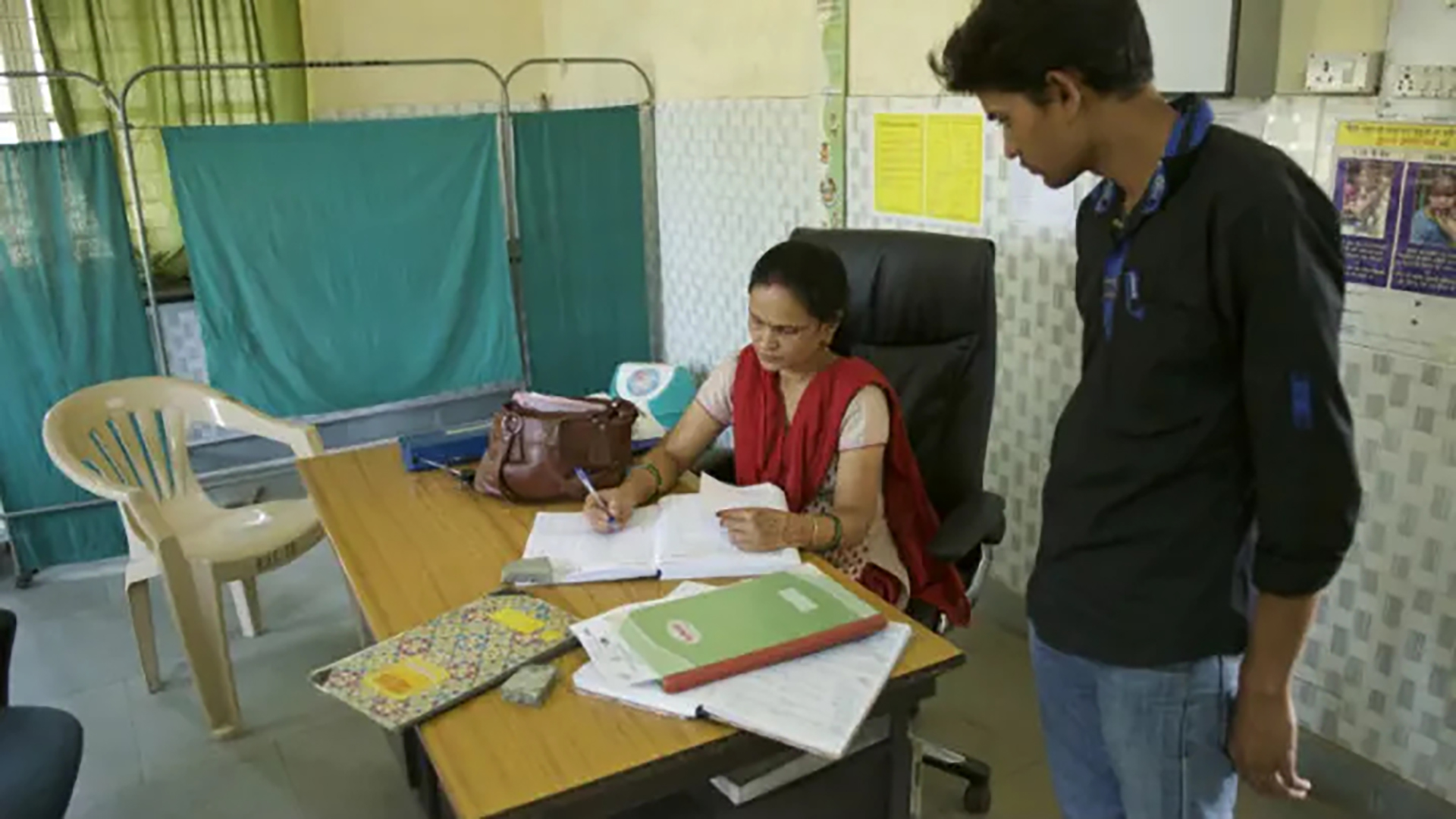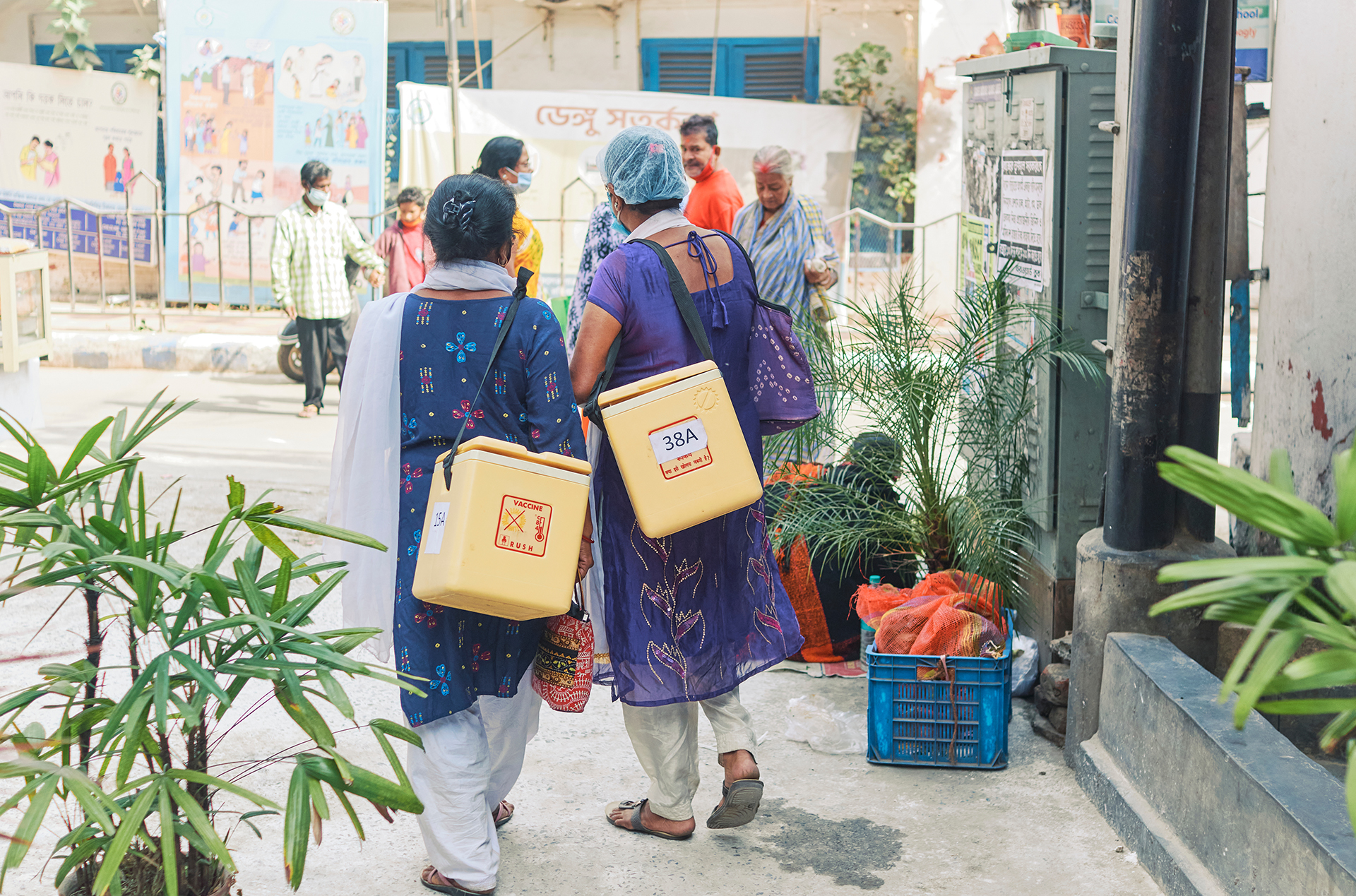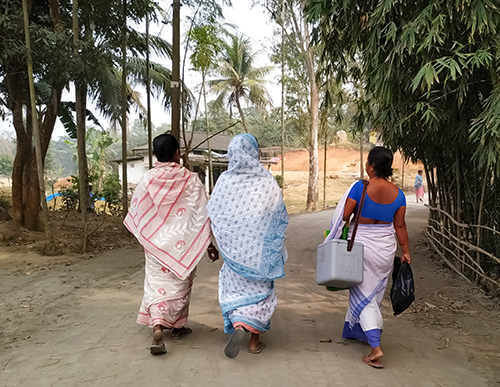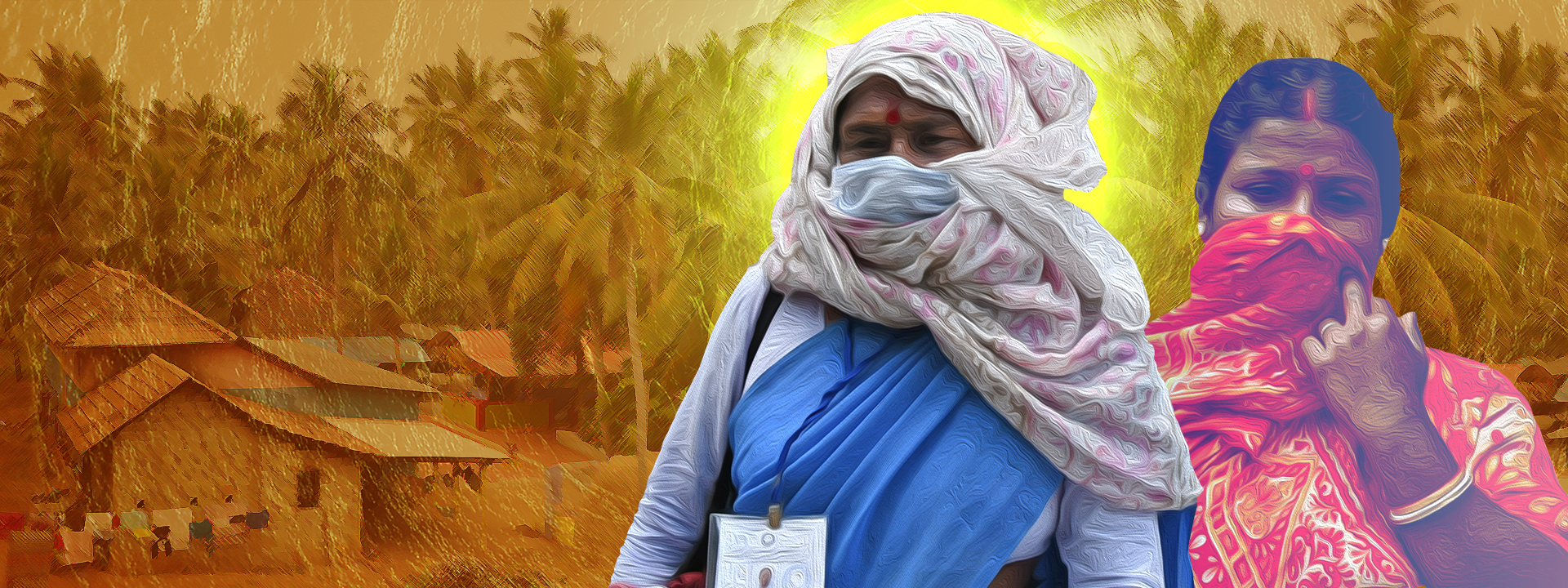During the COVID-19 lockdown, Ganga Devi of Champawat district in the Indian state of Uttarakhand developed abdominal pain after she gave birth. Parvati Devi, the Accredited Social Health Activist (ASHA, which is also the Hindi word for “hope”) assigned to Ganga’s village, realized that the mother’s placenta had not been properly removed. She requested five men to carry Ganga Devi to the closest hospital, which was five kilometers away from the nearest motorable road. The doctors who treated Ganga Devi said that but for Parvati’s prompt intervention Ganga would have died.
While everyone else in her village in Madhya Pradesh was staying home and safe during the lockdown, ASHA Vibha Srivastav was out and about. She was going door to door, distributing medicines, providing family planning services, and disseminating information about COVID-19. “Yet, people would keep their distance from me so that I couldn’t pass any infection to them,” she said.
ASHA Vidya Kamble from Sangli, a city in the state of Maharashtra, had to check on COVID-19 patients in her village. Sadly, after a long day’s work, she could not even enjoy the comfort of her own bed. She had sleep in the cattle shed outside her house to ensure she didn’t carry the infection home.

An estimated one million Accredited Social Health Activists are the backbone of India’s health care system. Photo: The White Ribbon Alliance / CC BY-NC-ND
Parvati, Vibha, and Vidya are just three of the estimated one million ASHAs in India. These women have been the foot soldiers of the country’s public health system even before the coronavirus pandemic. According to the National Rural Health Mission 2005, the ASHAs across India perform 43 critical duties from providing primary healthcare and promoting toilet construction to immunizations and taking pregnant women to the hospitals for their deliveries. The pandemic has added more tasks— such as conducting door-to-door surveys to identify the people with COVID-19 symptoms and visiting quarantined patients — to their already heavy workloads.
Yet, India’s ASHAs are not given the status of government employees. They are merely considered “volunteers,” given salaries ranging from US$27 to US$82 per month. They receive additional cash incentives for each woman that they bring to the hospital for childbirth and each patient that they persuade to undergo sterilization for birth control purposes or immunize.
“The ASHAs across India have attended online training, monitored migrants, sensitized the community on COVID-19 protocols, risked their health doing contact tracing — and accepted a meager 1,000 rupees (about US$13.65) for their COVID-19 duty,” says Poonam Muttreja of Population Foundation of India, which has tracked the ASHAs across the country during the pandemic. “They are amazing heroines to have done this.”
She’s not alone in saying this. Activists, feminists, and the ASHAs themselves believe that after having have proven their worth during the pandemic, their working conditions need to improve.
Undervalued work
Since the ASHAs are all women and are perceived as volunteers, many of them report routine gender bias at work. The pandemic made this worse as the ASHAs were tasked with contact tracing and enforcing inconvenient quarantines on community members who were unwell or had traveled.
“When on a door-to-door survey, I’m not just afraid of contracting an invisible virus,” said Seema Devi, an ASHA in Lucknow district in Uttar Pradesh. “[I also fear] the abuses people sometimes heap on me when I ask if they’ve recently traveled outside the district and, if so, followed quarantine protocols. They’re scared to tell me, and I’m scared of them.”
Across the country, the ASHAs have faced multi-layered challenges, according to Seher, a women’s collective for better health and rights and an operational unit of Delhi-based Center for Health and Social Justice. The collective has monitored the ASHAs in Karnataka, Madhya Pradesh, and Jharkhand during the lockdown. “The ASHAs are all women, some of whom belong to disadvantaged communities,” says Sandhya Gautam who heads Seher. She suspects that the undervaluation of their crucial role is at least partially because of this.
One glove
This undervaluation extended to the safety net extended to the ASHAs on COVID-19 duty. National Federation of ASHA Workers (NFAW) avers that frontline ASHA workers have received only the barest minimum of training in COVID-19 protocols and scarce protective gear during the pandemic. In Bihar, the ASHAs in districts like Madhubani, which saw the biggest influx of returning migrants, allege they were once given a single glove instead of a pair. The ASHAs in Maharashtra have made similar allegations.
It gets worse. Per Indian Medical Association, so far 44 ASHA workers across India have lost their lives during the pandemic. Countless others have been sick. “Since they are mere `volunteers,’ the government has not been forthcoming in providing aid and succor when the ASHAs have fallen ill,” says Gautam. Sunita Kumbhar, Block ASHA facilitator in Shirala Block (Sangli district of Maharashtra) says, “At least ten ASHAs tested positive in my block. The government didn’t help, and their families were shunned by neighbors who feared the spread of disease.” Instead, Kumbhar says, it was other ASHAs who came to their rescue.

For all their hard work, the ASHAs are merely considered “volunteers.” Their salaries range from US$27 to US$82 per month.
Moreover, the US$68,350 insurance cover, which was extended by the government for each frontline health worker who dies on duty in the fight against COVID-19, does not cover the costs of hospitalization and treatment when the ASHAs contract the disease. Most ASHAs cannot afford these high costs.
Meager pay
Although the contribution of the ASHAs to public health in the rural areas is critical, they are paid a pittance in most states. “We’ve been fruitlessly demanding at least US$136 as COVID-19 risk allowance in addition to the government-mandated minimum wage of US$246 per month,” says Vijay Lakshmi of NFAW. Instead, states like Delhi have given a meager US$13.67 for COVID-19 duty; other states have offered no extra incentives.
Meanwhile, across the board, the ASHAs have reported reduced incomes as incentivized tasks like facilitating immunizations, sterilizations, and institutional births fell during the lockdown. They are not entitled to paid vacation days either.
Unsurprisingly, resentment is rife among the ASHAs. In July 2020, around 40,000 ASHAs went on strike in Karnataka and demanded adequate safety equipment and a hike in salary. The following month, around 600,000 ASHAs participated in a two-day nationwide strike protesting the lack of government assistance given to them during the pandemic and the move to privatize basic services at government hospitals.
Even before the COVID-19 pandemic, the ASHAs played a key role in promoting public health in the country. “[We ASHAs] have enabled the success of India’s immunization program, facilitated institutional deliveries, and tracked and ensured the treatment of high-risk diseases like drug-resistant tuberculosis,” says Suman Pujari, state president of the Maharashtra ASHA Union. “Now, regularizing our work, salary, and working conditions is the only way to acknowledge our contribution.” ●
Geetanjali Krishna is a contributing editor with Business Standard and is the co-founder of The India Story Agency, which specializes in telling human interest, environmental, and social affairs stories and case studies from South Asia to the world. Her recent by-lines can be found in Times, BBC, Footprint magazine, and Business Standard.

The village ‘daughter-in-law’
The Accredited Social Health Activists (ASHAs) are the backbone of India’s health care system. ASHAs must be female, between 21 and 45 years old with middle-school education, and ideally should be a “daughter-in-law” of the village, either married, widowed, or divorced with a likelihood to live in the village for the foreseeable future.
Smisha Agarwal et al. assessed the impact of the ASHA program on the utilization of maternity services in India in a 2019 study. The researchers found that the program has increased the use of “antenatal care services, skilled birth attendance, and facility deliveries across caste, religion, and demographic groups.” They stated that “Most importantly, our analysis suggests that the ASHAs are more likely to reach groups that are typically left out of the formal health care system — poorer populations living in rural areas and women belonging to backward castes.”
By Asia Democracy Chronicles



















